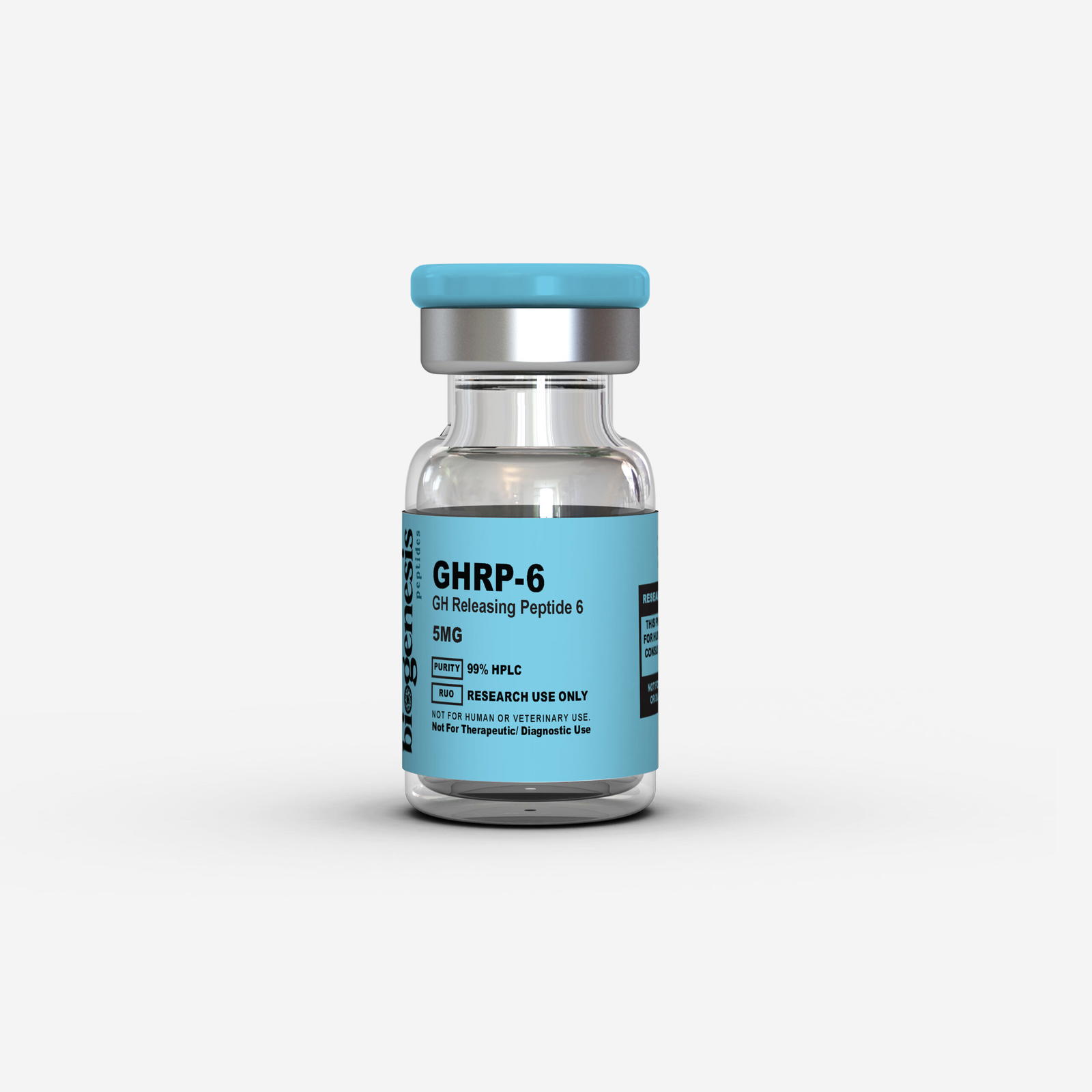Product Usage
THIS PRODUCT IS INTENDED AS A RESEARCH CHEMICAL ONLY. This designation allows the use of research chemicals strictly for in vitro testing and laboratory experimentation only. All product information available on this website is for educational purposes only. Bodily introduction of any kind into humans or animals is strictly forbidden by law. This product should only be handled by licensed, qualified professionals. This product is not a drug, food, or cosmetic and may not be misbranded, misused, or mislabeled as a drug, food, or cosmetic.
GHRP-6 5mg
GHRP-6 (Growth Hormone-Releasing Peptide-6) is a synthetic peptide that stimulates growth hormone (GH) release by acting as a ghrelin receptor agonist. It has been extensively studied for its potential benefits in appetite regulation, tissue repair, cognitive function, and cardiovascular health.
$32.00
Peptides will arrive in a lyophilized (powder) form for maximum stability
Out of stock
Buy 5 for 5% off
Buy 10 for 10% off
Buy 15 for 15% off
OVERVIEW
GHRP-6 (Growth Hormone-Releasing Peptide-6) is a synthetic peptide that stimulates growth hormone (GH) release by acting as a ghrelin receptor agonist. It has been extensively studied for its potential benefits in appetite regulation, tissue repair, cognitive function, and cardiovascular health.
Research suggests GHRP-6 may:
- Enhance memory and cognitive function, supporting long-term memory formation.
- Promote neuroprotection, reducing inflammation and cell death in brain tissue.
- Accelerate skin and wound healing, increasing collagen production and reducing scar formation.
- Protect heart tissue, minimizing oxidative stress and damage following myocardial infarction.
- Regulate mood and sexual motivation, possibly reducing symptoms of depression and stress.
- Support metabolic balance, potentially influencing obesity and energy homeostasis.
Due to these properties, GHRP-6 has potential therapeutic applications in neurological disorders, cardiovascular health, and tissue regeneration.
RESEARCH
GHRP-6 and Cognitive Function
- Studies suggest GHRP-6 enhances memory formation and spatial learning, indicating potential cognitive benefits.
- May aid in converting short-term memories into long-term storage, improving overall cognitive performance.
- Potential application: Treatment for age-related cognitive decline and neurodegenerative disorders.
GHRP-6 and Neuroprotection
- Research indicates that GHRP-6 reduces inflammation and prevents apoptosis (programmed cell death) in brain tissue.
- May play a role in stroke recovery and neurodegenerative diseases such as Parkinson’s disease.
- Potential application: Neuroprotection and post-stroke rehabilitation.
GHRP-6 and Skin Healing
- GHRP-6 has been found to promote tissue regeneration and enhance wound closure.
- Increases collagen production, reducing the risk of hypertrophic scarring.
- Potential application: Treatment for burn injuries, post-surgical healing, and chronic wounds.
GHRP-6 and Cardiovascular Benefits
- Studies in animal models suggest GHRP-6 reduces heart damage following a myocardial infarction (heart attack).
- May protect heart cells from oxidative stress, improving cardiac function.
- Potential application: Cardioprotection and post-heart attack recovery.
GHRP-6 and Mood Regulation
- Research in rats suggests that GHRP-6 influences sexual motivation and mood by interacting with ghrelin receptors in the brain.
- May help regulate symptoms of depression and stress, offering mood-enhancing benefits.
- Potential application: Mental health support and stress management.
GHRP-6 and Metabolism
- GHRP-6 has been investigated for its role in regulating metabolism, particularly in growth hormone secretion and energy balance.
- Potential application: Treatment for metabolic disorders and obesity management.
STRUCTURE
- Molecular Formula: C₄₆H₅₆N₁₂O₆
- Molecular Weight: 873.032 g/mol
- Amino Acid Sequence: His-D-Trp-Ala-Trp-D-Phe-Lys
- CAS Registry Number: 87616-84-0
- Mechanism of Action: GHRP-6 binds to the ghrelin receptor (GHS-R1a) in the hypothalamus and pituitary gland, stimulating growth hormone release, which enhances cell growth, tissue repair, and metabolic function.
CITATIONS
- Huang, C.-C., Chou, D., Yeh, C.-M., & Hsu, K.-S. Acute food deprivation enhances fear extinction but inhibits long-term depression in the lateral amygdala via ghrelin signaling. Neuropharmacology (2016).
- Beheshti, S., & Shahrokhi, S. Blocking the ghrelin receptor type 1a in the rat brain impairs memory encoding.Neuropeptides (2015).
- Tóth, K., László, K., & Lénárd, L. Role of intraamygdaloid acylated-ghrelin in spatial learning. Brain Res. Bull. (2010).
- Subirós, N. et al. (Additional references pending completion)
All products on this site are for Research, Development use only. Products are Not for Human consumption of any kind.
The statements made within this website have not been evaluated by the US Food and Drug Administration. The statements and the products of this company are not intended to diagnose, treat, cure or prevent any disease.
Biogenesis Peptides is a chemical supplier. Biogenesis Peptides is not a compounding pharmacy or chemical compounding facility as defined under 503A of the Federal Food, Drug, and Cosmetic act. Biogenesis Peptides is not an outsourcing facility as defined under 503B of the Federal Food, Drug, and Cosmetic act.

